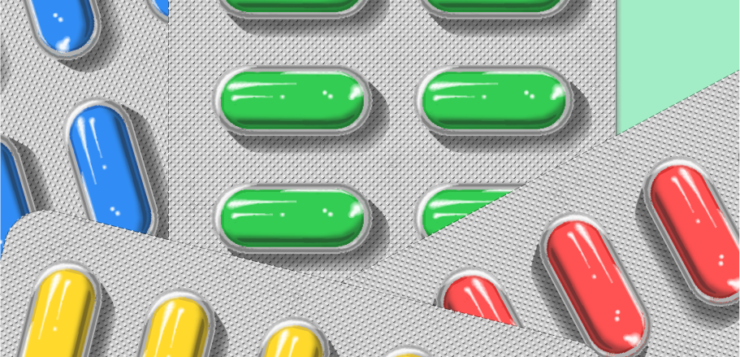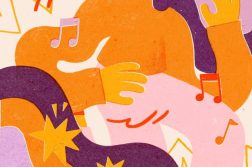- My Relationship with… Fear
- My Relationship With… My Hair
- My Relationship With… TikTok: Revisited
- My Relationship With… Body Hair
- My Relationship With… The Pill
- My relationship with… an STI
- My Relationship with… TikTok
- My Relationship With… Anti-Depressants
- My Relationship With… Unreasonable Perfectionism
- My Relationship With… CLP
- My Relationship With… Voices and Anti-Psychotics
- My Relationship With… Baking
CW: This article alludes to themes like mental illness, intrusive thoughts and abusive relationships. Reader discretion is advised.
Medication is simultaneously my best friend and worst enemy. Taking it means that I can get up, get out of bed and function in the world when my mind left me chained to my sheets, but I’d be lying if I said it didn’t come at a cost. Physically and mentally, I have had to accept that I will never be the person that I was before I started taking medication, and that has been something that only recently I’ve been able to come to terms with.
The first thing that people need to understand is that the decision to take medication, especially for a mental health condition, isn’t an ‘easy way out’ or a decision that was made overnight. I’ve always been a neurotic person: the kind of person who’d think a headache was a surefire sign of a deadly brain tumour, but apart from that I was generally okay.
Sure, I would find myself irrationally worrying about my health, future and death a lot more than most people, but I’ve always been the kind of person to huddle alone with a book during breaktimes, so it was largely thought that I wasn’t acting that out of the ordinary. Maybe I’m looking back at my pre-medicated self with slightly rose-tinted goggles, but from what I remember, I was just starting to develop in confidence: just started to get out of that gloomy mindset. I had begun a part-time job, made a lot of new friends and was getting straight As in my AS-Levels.
Then, I met a boy. He wasn’t particularly attractive or interesting, but I was starting to become conscious of the fact that I was the only one out of my peers who had never had a boyfriend or the ever-elusive romantic ‘experience’. Something in my gut told me it wasn’t right, that I shouldn’t go into a relationship where I wasn’t really invested, but I buried it deep and went along with it.
Unfortunately, a month into the new relationship, a lot of bad stuff happened that left me with trauma, fractured relationships and an all-consuming phobia that I still haven’t managed to shake, even five years later. The sad thing is that even though the whole red flag committee were blaring sirens, somersaulting and screaming: ‘THIS IS A BAD IDEA’ over and over again, it was too late at that point. In such a short amount of time, I had convinced myself that this level of co-dependence was completely healthy, and that he was the only person who could possibly love me or accept me. I thought I was in love, but it took me a long time to realise that I was actually in the throes of a toxic, emotionally-abusive relationship.
Although some might say I was lucky it ended when it did, they don’t realise that I was left life-long OCD, anxiety and depression as a thank-you present: conditions that were always bubbling away in some area deep inside me, but may have never come to the surface if it wasn’t for what I was experiencing. Everyone thought that my feelings would pass, that I was going through a bad break-up and that I would spring up again, good as new, but this black tar of anxiety suffocated me until I was an inconsolable ball in my duvet day and night. So, they put me on 20mg of fluoxetine. ‘It was only temporary,’ they said. ‘It is just something to help you function and finish your A-Levels’.
Instead of ‘function’, what I got in return was an all-consuming, constant exhaustion that was apparently a common side-effect, but meant that I had to do my final year of sixth form on flexi-time. I experienced worsened depression, dizzy spells and cold sweats but eventually, the fog cleared a little. It wasn’t the same as before, and it didn’t stop the intrusive thoughts and spirals, but it did mean my spiralling was a lot more manageable, and that my panic attacks were a lot more few and far between.
But, after a while, the intrusive thoughts and anxiety came back just as intense as they were before, so my prescription would climb higher and higher until I was told: ‘Nobody on your age should be on that level of medication,’ and was then switched to something else. After nearly three-years on fluoxetine, I had a year-long dalliance with sertraline, and then the same thing happened. Massive worsening. Brief improvement. Growing waistline. Headaches and exhaustion. Anxious again. Higher dose. Too high. Fluoxetine again. And this was all alongside completely useless, severely underfunded one-size-fits all CBT that doesn’t take into account the complexities of OCD, intrusive thoughts and rituals.
Five years down the line, I am now on my third kind of antidepressant: venlafaxine. After over six months of adjusting my doses, working through the brain fog and trying to adapt to life with permanent exhaustion, I think it’s working okay for now. I still forget to take it sometimes, but the ever-nasty side-effects (this time, it’s something called ‘brain zaps’ – a lot less fun than they sound) serve to remind me when it’s time to take them.
When I read things online like: ‘You don’t need that poison in your body,’ or ‘Just have a glass of water and some fresh air rather than happy pills’, I sometimes feel a little guilty. Is relying on medication a sign of my own personal weakness? Does it indicate an inability to manage or regulate my feelings for myself? This couldn’t be further from the truth. Medication is messy, confusing and comes with it’s own set of difficulties you never thought you’d have to deal with, but if you stick it out and find what medication works for you, it can help you navigate yourself not to the ‘normal’ you were before, but to a new normal. This new normal might be different, complicated and leave you feeling a little battleworn, but it is nonetheless a means for you to live your life.
Sometimes, I look in the mirror at my size 16 frame (I was a size 8 before I started medication), and wonder if it was a mistake taking it in the first place. But what I, and everyone experiencing mental health issues needs to remember is that we owe it to ourselves to not just exist, but to live. We deserve to laugh, smile, make memories and finish our education just the same as anyone else, and the barriers in our brain shouldn’t deprive us of living the life we know we deserve. I know first-hand that adapting to medication is a battle in itself, but I guess we can call it a ‘necessary evil’ that we need to live through in order to get some semblance of enjoyment, functionality and existence back.
So, if you’re someone whose on medication, have no doubt of your personal strength and resilience: you’re doing amazing, and some clueless Karen asking you to ‘breathe’ on the internet doesn’t change that.




